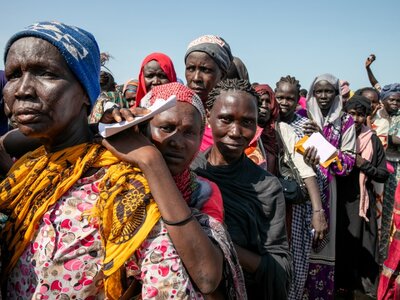Emergency
South Sudan
- 7.7 million
- people are acutely food insecure
- 2
- counties in Upper Nile State at risk of famine
- US$274 million
- needed for WFP operations to December 2025
People in Nasir and Ulang counties in South Sudan are at risk of famine in the coming months, as conflict in Upper Nile State escalates – destroying homes, disrupting livelihoods and impeding the delivery of humanitarian aid.
A total of 32,000 people are in Catastrophic (IPC Phase 5) hunger conditions in Upper Nile state, more than three times the previous projection.
Overall, food insecurity is nearing record highs, with 7.7 million people (57 percent of the population) projected to be in Crisis or worse levels of hunger (IPC Phase 3+) during the lean season which started in April. A total of 2.3 million children are at risk of malnutrition.
Over 1 million people have fled to South Sudan since Sudan's war began, only to find more hunger on arrival as severe economic deterioration, extreme weather and conflict take a heavy toll.
The multiplying shocks have made it impossible for smallholder farmers in many areas to grow enough food. Additionally, with a heavy reliance on imports, many people across South Sudan are unable to afford basic food items and must rely on humanitarian assistance.
The World Food Programme (WFP) provides people fleeing Sudan with fortified biscuits or hot meals, a one-time food or cash ration, and nutrition support for children and mothers at border areas. These people are then integrated into regular WFP assistance in their communities of origin or refugee camps.
While much of WFP's activities are focused on keeping people alive, we are also working with conflict and climate-affected communities to implement long-term solutions to reduce hunger.
Funding for both humanitarian responses and resilience-building are failing to keep pace with rising needs. This means WFP can only provide half rations and must prioritize life-saving assistance for those closest to famine. Humanitarian access in the conflict-affected areas remains severely constrained, leaving vulnerable communities without vital support during the lean season.
WFP needs US$274 million for operations up to December 2025.
What the World Food Programme is doing to respond to the South Sudan emergency
-
Food assistance
-
Funding shortfalls mean WFP can reach just 2.5 million people – around only 30 percent of acutely food insecure people - across the country with emergency food assistance, focusing on communities at immediate risk of starvation.
-
Climate resilience
-
WFP has been supporting the rehabilitation of infrastructure including dykes and roads, in areas affected by widespread flooding. We have further supported families in growing flood-resistant crops like rice and increasing the production of vital cereals.
-
Cash transfers
-
In South Sudan, WFP uses cash transfers across its programmes and activities, navigating the challenges of a fragile political context, with related security issues, as well as inflation. Cash assistance empowers beneficiaries letting them choose what to buy, and increases cost-efficiency and effectiveness, reducing the need to transport and preposition food commodities.
-
School meals
-
Schools meals support a healthy and productive learning environment for children, increasing enrolment and attendance rates. WFP plans to assist more than 377,000 children through school meals in 2025, to encourage school attendance.
-
Nutrition
-
As part of its emergency response, WFP provides specialized nutritious food and nutrition counselling to pregnant and breastfeeding women and children, including refugees and those affected by conflict and displacement. The nutrition programme has a dual approach – treating malnutrition among pregnant or breastfeeding women and children under 5, and preventing it in children under 2 and their mothers. In collaboration with UNICEF and other partners, WFP ensures that life-saving nutrition assistance reaches the most remote and crisis-affected areas of the country.



